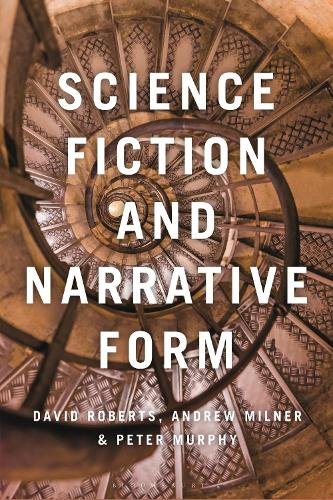
Science Fiction and Narrative Form
(Paperback)
Available Formats
Publishing Details
Science Fiction and Narrative Form
By (Author) Professor David Roberts
By (author) Dr Andrew Milner
By (author) Dr Peter Murphy
Bloomsbury Publishing PLC
Bloomsbury Academic
22nd August 2024
United Kingdom
Classifications
Professional and Scholarly
Non Fiction
Science fiction
Fantasy
809.38762
Physical Properties
Paperback
240
Width 152mm, Height 232mm, Spine 18mm
360g
Description
Establishing science fiction as its own distinct and increasingly important narrative form, this book explores how the genre challenges pervasive perceptions of society as they appear in the conventional modern novel. Inspired by, and building upon, Georg Lukcss criticism of the orthodox novel for its depiction of life as alienating and disjointed, Milner, Murphy and Roberts demonstrate that science fiction steps beyond this contemporary form to be a more constructive form of literature, one able to conceive of society as complete, integrated and well-rounded. Taking stock of three kinds of science fiction which lie outside the scope of the modern novel theological/ ontological science fiction, the science fiction of future history and epic science fiction this book demonstrates the genres unique capacity to encapsulate the whole world, persons and events, things and objects in a glance, and address the motive behind the longing for meaningful totality. With reference to a vast array of works by authors such as Michel Houellebecq, Elias Canetti, Isaac Asimov, Jules Verne, H. G. Wells, Aldous Huxley, Marge Piercy, Iain M. Banks, Margaret Atwood, Ursula K. Le Guin, William Gibson, Dirk C. Fleck, Philip K. Dick, George Orwell and Kazuo Ishiguro, this book offers a compelling argument for rethinking the position and potential of the science fiction novel and to challenge the way we perceive our culture.
Reviews
Innovative, provocative, and at a level of intellectual seriousness far too rare. ... It should stand as a striking and essential contribution to the long-running debate about sf and form. * Science Fiction Studies *
Science Fiction and Narrative Form argues that, amid escalating anthropogenic crises, science fiction is essential: only the genres historicizing imperative and epic scale, its peculiar temporalities and world-building strategies, its absent gods and invisible hands, can make up for the parochial, exhausted literary novel. Magisterial, nuanced and highly recommended. * Mark Bould, Reader in Film & Literature, Faculty of Arts, Creative Industries, and Education, University of West England, UK *
Author Bio
Andrew Milner is Emeritus Professor at Monash University, Australia. His publications include Locating Science Fiction (2012), Again, Dangerous Visions: Essays in Cultural Materialism (2018), (with J. R. Burgmann) Science Fiction and Climate Change: A Sociological Approach (2020). Peter Murphy is Adjunct Professor at La Trobe University and James Cook University, Australia. His publications include The Political Economy of Prosperity: Successful Societies and Productive Cultures (2020), The Collective Imagination: The Creative Spirit of Free Societies (2012) and Dialectic of Romanticism: A Critique of Modernism (2004). David Roberts is Emeritus Professor, School of Languages and Cultures, Monash University, Australia. His publications include History of the Present: The Contemporary and its Culture (2021), The Total Work of Art in European Modernism (2011) and Dialectic of Romanticism: A Critique of Modernism (2004).
